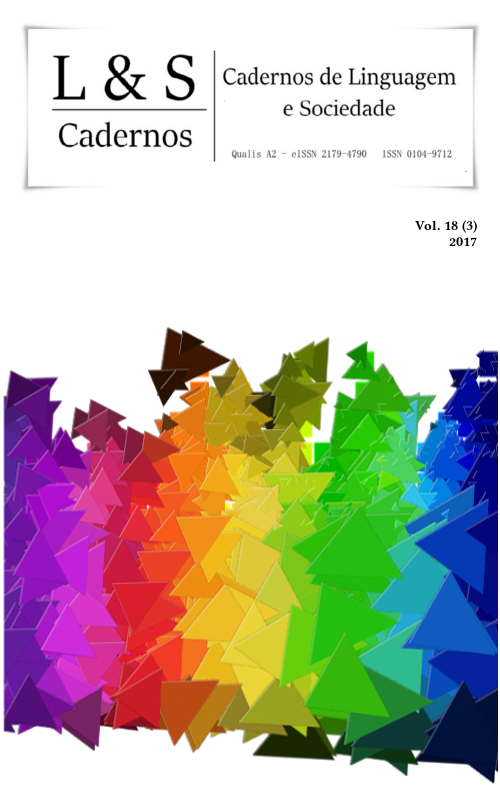HOUSE DEFEATS DILMA, AND MINAS FAILS AÉCIO: A FUNCTIONAL-COGNITIVE ANALYSIS OF BRAZILIAN NEWSPAPER HEADLINES
DOI:
https://doi.org/10.26512/les.v18i3.7468Keywords:
functional-cognitive linguistics; ideological manipulation; Brazilian elections 2014; newspaper headlinesAbstract
This paper intends to evaluate Brazilian newspaper headlines under the perspective of functional-cognitive Linguistics. How do headlines affect the cognitive process of reality and ideology acquisition? We analyzed headlines published at O Globo and Folha de S. Paulo newspapers, collected between October 6th and October 31st 2014 (from the 2nd round definition to the election results). We evaluate features such as: metaphors and metonymies; strategies of voice changing; choices of (non-)prototypical alignments between grammatical relations, semantic and pragmatic roles; and the relation between such alignments and the representations built by the speeches produced by the politics section of Brazilian newspapers. Preliminary results show how headlines work characters: President Dilma does not have control over the situation, and Aécio is a victim of the circumstances.
Downloads
References
DEVELOTTE, C.; RECHNIEWSKI, E. Discourse analysis of newspaper headlines: a methodological framework for research into national representations. 2000. Available at: <http://wjfms.ncl.ac.uk/titles.htm>. Last access on Nov. 12 2015.
EMPRESA BRASIL DE COMUNICAÇÃO. Available at <http://www.ebc.com.br/>. Last access between June and August 2015.
FURTADO DA CUNHA, M. A.; BISPO, E. B.; SILVA, J. R. Linguística funcional centrada no uso. In: CEZARIO, M. M.; FURTADO DA CUNHA, M. A. (Orgs.). Linguística centrada no uso ”“ uma homenagem a Mário Martelotta. Rio de Janeiro: Mauad/FAPERJ, 2013.
FURTADO DA CUNHA, M. A.; SOUZA, M. M. Transitividade e seus contextos de uso. São Paulo: Cortez, 2011.
GIVON, T. Funcionalism and Grammar. Amsterdam: John Benjamins, 1995. 486 p.
HOPPER, P. J.; THOMPSON, S. A. Transitivity in grammar and discourse. Language, v. 56, n. 2, p. 251-299, jun. 1980.
LAKOFF, G. Women, fire, and dangerous things: what categories reveal about the mind. Chicago: University of Chicago Press, 1987. 614 p.
LAKOFF, G. The Political Mind. A Cognitive scientist’s guide to your brain and its politics. New York: Penguin Books, 2008. 292 p.
LAKOFF, G.; JOHNSON, M. Metaphors we live by. Chicago: University of Chicago Press, 1980. 242 p.
MARTELOTTA, M. E. Mudança Linguística: uma abordagem baseada no uso. São Paulo: Cortez, 2011. 136p.
OLIVEIRA, M. R. Contexto: definição e fatores de análise. In: OLIVEIRA, M. R. de; ROSÁRIO, I. C. (Orgs.). Linguística centrada no Uso ”“ teoria e método. Rio de Janeiro: Lamparina, FAPERJ, 2015.
PAYNE, T. E. Describing morphosyntax: a guide for field linguists. Cambridge: Cambridge University Press, 1997. 413 p.
ROSCH, E.; MERVIS, C. B.; GRAY, W. D.; JOHNSON, D. M.; BOYES-BRAEM, P. Basic objetcts in Natural Categories. Cognitive Psychology 8, 382-439, 1976.
TOMASELLO, M. Introduction: a cognitive-functional perspective on language structure. In: TOMASELLO, M. (ed.). The new psychology of language: cognitive and functional approaches to language structure. New Jersey: LEA, 1998, p. vii-xxiii.
TOMASELLO, M. Constructing a language: a usage-based theory of language acquisition. Cambridge: Harvard University Press, 2003.
TRAUGOTT, E. C. Exaptation and grammaticalization. In: AKIMOTO, M. (Ed.) Linguistics studies based on corpora. Tokyo: Hituzi Syobo Publishing Company, 2004.
TRAUGOTT, E. C.; DASHER, R. B. Regularity in semantic change. Cambridge; New York: Cambridge University Press, 2002. 341 p.
VAN DIJK, T. Ideology and discourse: a multidisciplinary introduction. Barcelona: 2000. Available at: <http://www.discourses.org>. Last access on July 18 2015.



